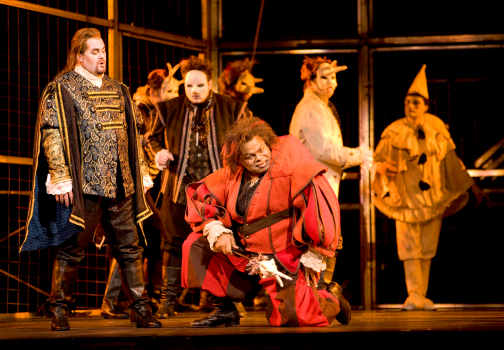Other Links
Editorial Board
-
Editor - Bill Kenny
-
Deputy Editor - Bob Briggs
Founder - Len Mullenger
Google Site Search
SEEN AND HEARD
INTERNATIONAL OPERA REVIEW
Verdi, Rigoletto: Vancouver
Opera, soloists, cond. Leslie Dala, dir. Glynis Leyshon, scenic
designer Bretta Gerecke, lighting designer Harry Frehner,, chorus
dir. Kinza Tyrrell, Queen Elizabeth Theatre, Vancouver, British
Columbia, 7.3.2009 (BJ)

Donnie Ray Albert (Rigoletto) and Eglise Gutierrez (Gilda)
It was one of those evenings that I start by hating, but gradually
come, if not exactly to love, at any rate to respect. The promise of
a “bold new take” on a work like Rigoletto always arouses
some anticipatory qualms in this reviewer’s mind, and the stage
picture, open to view even before the Prelude began, served only to
heighten misgivings: an industrial-looking construction of metallic
grids on two levels, calculated to divorce the action as radically
as possible from any imaginable 16th-century Mantuan court.
Bruce Sledge (Duke) and Donnie Ray Albert (Rigoletto)
Bretta Gerecke’s set, moreover, was not always practical in terms of
sight-lines: in one long passage, a projecting suspended door made
the activities of several characters upstage almost invisible to me
and, I suspect, at least several hundred other members of the
audience. It also did the singers no favor. When they had to sing on
the upper of the two stage levels, some way back from the
proscenium, they were hard put to it to make any real impact over
the orchestra–it was a pleasure to hear so much orchestral detail,
finely realized under Leslie Dala’s baton, but the vocal texture was
seriously reduced in richness and power. I thought at first that
Bruce Sledge, playing the Duke, possessed little in the way of
voice, yet as soon as he was allowed to come down and forward, he
showed that he is indeed a tenor of considerable strength and
(except for the drearily predictable interpolated high note at the
end of “La donna è mobile”) impressive artistry. Spatial
considerations may similarly excuse a touch of unevenness in the
singing of the Gilda. The young Cuban-born Eglise Gutierrez looks
the part, and acted superbly; a note or two here and there seemed to
emerge rather too strongly from the line, but hers is an ideal Gilda
voice, promising great things when she is not saddled by an
unhelpful stage environment, and she deserved the rapturous ovation
that greeted her at the end of the performance.
Then the lights went up, and we were greeted with a truly motley
assemblage of characters, complete with stilt-walker and trapeze
artist, dressed in a variety of costumes of all periods or none. The
scene looked like nothing so much as “A Night at the Marx Brothers,”
with a cast that even included one obvious Harpo look-alike.
The director’s aim, she explained, “Drawn by the strong metaphors at
the centre of the opera,” was “to look at a kind of ‘circus’
metaphor.” And the first scene did indeed make some sense of this
conception, portraying a milieu emancipated from any kind of logic,
restraint, or morality. Unfortunately, this imaginative treatment
degenerated at times into the most infantile literalism, as when
Gilda made her first appearance not just virtually but actually in a
cage, next to which a crescent moon descended onto the scene,
presumably to represent the Spirit of Romance.

I was seeing the production, originally staged in Calgary, on its
opening night in Vancouver,
and I have to acknowledge that the balance between voices and
orchestra gradually improved as the evening continued. Donnie Ray
Albert, whom I last encountered as a wonderful Porgy in Gershwin’s
opera, sang and acted Rigoletto with enormous authority, though his
Italian diction left something to be desired, particularly in the
matter of rolled r’s. Other excellent vocal contributions came from
John Conlon’s Marullo, Willy Miles-Grenzberg’s Ceprano, Raphael
Wagner’s Countess Ceprano, and especially the richly projected
Monterone and Sparafucile of Chad Louwerse and Kirk Eichelberger.
The latter set up the opera’s shocking denouement with great
conviction, and Gutierrez and Albert played their parts to riveting
effect. I could happily have done without the deceased Gilda’s
ghostly departure from the scene–at least she wasn’t air-lifted to
Heaven, as I feared for a moment might happen–but all in all,
Verdi’s sure-fire thriller duly thrilled, and an Aristotelian blend
of pity and terror prevailed over whatever reservations I had about
Ms. Leyshon’s production.
Pictures ©
Tim Matheson
Back
to Top
Cumulative Index Page
